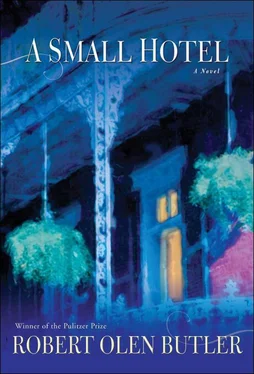∼
On this night, as Michael hears an overt declaration of love from a new woman and as Kelly stands naked in the middle of her hotel room near her Scotch and her pills, as they both continue to churn with the past that brought them to this present moment, neither will turn to those strangely muted weeks following Kelly’s confession. Michael moved into the Crowne Plaza, covering the desk with his papers and neatly lining up his empty two-a-night mini whiskey bottles on the TV cabinet, and Kelly often stood in the center of rooms for long stretches of time, listening to the ticking of her house or the humming of her refrigerator or the bratting of a motor boat passing on the bayou. When the two of them spoke, it was to deal with the details of the divorce, and they were sad and calm and quiet and business-like and mutually, wearily agreeable over assets.
One Sunday afternoon in the midst of the process, as Michael returned to the house to clean out his office downstairs, Kelly retreated to her office next to the master bedroom upstairs. Her office. She looks around. She has always worked. But Michael made it possible for her to work hard and not worry about making money. On the wall are photos of her with charity bigwigs and politicians. And framed thank-you letters. Make-A-Wish and the homeless. Habitat for Humanity and the symphony. The four causes she worked for over the years. Too many causes, perhaps. She was too restless. She should have stayed with one. But they all said thank you. And there were times — especially away from the offices, away from the fundraisers — at the hospitals and the shelters, at the building sites and the dressing rooms — there were times when they even said we love you . She thinks: how pathetic I have been.
She rises up and goes out of her office and into the bedroom and she closes the door and she locks it and she lies down on the bed and she begins to do the silent little number-mantra she’s used over the years to clear her head and sleep. Oh three oh six eight four. Oh three oh six eight four. Keep those imageless numbers sounding loudly in her head, and the image-laden, free-associating thoughts — the sleep killers — don’t have a chance to enter into her. But she sits up abruptly now. The numbers became simple sounds over the years, but the source of them lurches back into her now: March 6, 1984. Mardi Gras. The day she met Michael. She lies back down. She whispers softly to herself, “Oh shit.” She will keep the house but she will lose her sleep aid.
But she soon sleeps anyway. And she wakes. And she has no idea how long it has been. It feels like a long time. She assumes it’s been a long time. Her head feels pumped full of something hot and gaseous. She has a bitter taste in her mouth. She goes out of the bedroom and along the hall and down the stairs, and as she takes the last step into the foyer, Michael emerges from the hallway to his office. They both stop abruptly. It feels to her like the dark, alternate-universe equivalent to her stepping from the preparation room before her wedding, heading off to pee, and there he was. Out of place. Wanted and not wanted.
“You’re still here,” she says.
“I’m empty handed,” he says. “But it’s all sorted. I’ll have someone come and move the things.”
“I lost track of time is all. I slept.”
“Good,” he says. Softly.
They stand where they are. They don’t move.
“I was just leaving.” he says.
“All right.”
“My office …” he begins, but he doesn’t finish the thought. He tries to decide whether to speak the thing that struck him a short time ago, as he was preparing to leave his life in this house, in this marriage. Ever since that terrible early evening in the Quarter, he has said nothing, asked nothing, about what happened to make her go to another man. It happened. She sought it. The other man ended it. The last thing Michael wants to do — it would be impossible for him — is to do anything to persuade her to stay with him. It’s a thing the woman who is his wife either wants for herself or she doesn’t. His life is built on advocacy, but he realized as soon as he forced back those initial tears that for him there can be absolutely no advocacy in this circumstance. She has to want him freely, with no persuasion, or she doesn’t want him at all. Prima facie. And what he would say right now could be misconstrued as a kind of persuasion, and that’s why he is hesitating. But he wants her to know. “My office,” he says, “seems cleaner than it should be.”
“I haven’t touched a thing,” Kelly says
“I’m not suggesting you have.” His hands flare open before him. And of all things to think about right now, it strikes him that the gesture he just made has some deeply instinctive link back to the caves, a show of having no weapon. He’s thinking a little crazy now. He drags his mind back to this thought he had while emptying his office. “I was just realizing,” he says. He stops again. What has he realized? “I just realized that I never spent as much time working at home as I thought I would.” He should never have begun this. He knew not to say anything, he knew just to let her go, but now he’s sounding crazy, as well.
But Kelly knows what he’s trying to say. “That was never an issue,” she says. And if she has some inclination — some — yes, of course she has some — if she is in any way open at last to saying the things she could not say before, now that she isn’t asking for them anymore, now that she has herself burned down this life they’d made together, now that it makes no difference anyway if he actually loves her enough to say so freely and explicitly — if she has any impulse to explain how all of the unspoken things became a deep river-current that eventually swept her away, it vanishes abruptly with this cluelessness of his. She had sex with a man she hardly knew and in doing so destroyed the inner life of this marriage, and he thinks it might be about where he did his paperwork?
He’s not answering.
“Do you think it was about that?” she says, and she sounds to herself as if she’s speaking while choking.
“I don’t know.”
“You don’t know?”
“How am I supposed to know?”
“How?” Her throat has suddenly cleared and her voice rings loud around them both.
He keeps his own voice low but firm. “You had an affair and it’s the last thing in the world I expected and you said the marriage is over and we’re not talking about it and I’m fine with that but …”
“I’m sure you’re fine with that.”
“But I can’t be blamed …”
“Of course we’re not talking.” And Kelly is shouting.
And Michael wants to shout but he doesn’t, he finds the same control of his voice he finds in a courtroom, and he says, “I can’t be blamed if I’m wrong about some of the things …”
“So blame me ,” she cries. “I deserve it. If you can’t love me then at least hate me.”
And he doesn’t say a word. He moves past her and he opens the front door and he goes out and he doesn’t think to close the door and she watches for a moment as he goes down the walk, and then she turns her face away from him and her hands were too slow, her hands wish now they’d clawed at his face as he passed, just to get him to do something in return, anything.
∼
And Michael says nothing in response to Laurie’s declaration of love. Not that there’s a recoil in him. He simply does not hear it for what it is. For Michael, it is a woman’s rhetoric. These are simply words. Easy currency for a woman. For him, she’s here and he’s here with her. That’s so because they find things in each other they each seem legitimately to enjoy. They’re going to their cottage and they will be naked together and they will join their bodies and they will unjoin them. They will fall asleep together. They will wake and they will rise in the morning. Good morning, how’d you sleep. Fine. They will eat breakfast in the restaurant that was once the living quarters for the post-war field workers. Are you enjoying yourself? Yes. And you? And now and then he will think about the retired Navy captain and also about Monday afternoon and jury selection for a pro-bono who will be tough to protect from bias. While Michael is with Laurie, he will think of no other woman in the same way that he is thinking of her. He will try to think of no other woman at all, particularly the woman at the center of a considerable pain in him. He will be open to the possibility of many more nights of joining and of sleeping and of waking with this woman he has just kissed. For him, that too is considerable. And his response to her rhetoric is to let his hand fall to the small of her back and to turn her and move them off toward the cottage. And for now, this gesture — particularly his hand in the small of her back — is sufficient for Laurie.
Читать дальше












